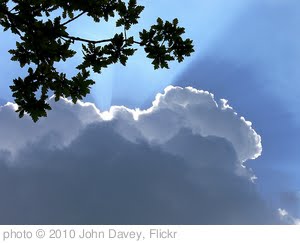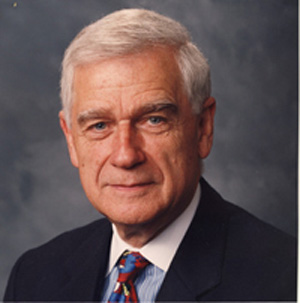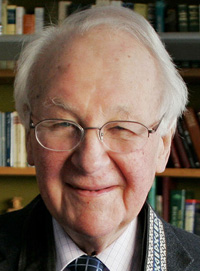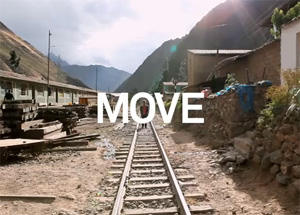Sojourners
It was over in less than a minute. Three miles below the surface of the earth near a town in Virginia called Mineral, a fault line shifted. As a result, a 5.8 magnitude earthquake was felt from Georgia to New England and as far west as Detroit. The National Cathedral lost several stone spires, the Washington Monument cracked, and Sojourners' office was closed for the afternoon, as our building was checked for structural damage.
Tectonic plates move beneath our feet in the part of the globe that scientists refer to as the lithosphere. Over the course of a year, an average plate will move as little as 3 to 6 centimeters. The speed of their movement is 10,000 times slower than the hour hand on a clock and even slower than the rate of growth of human hair. For decades, sometimes centuries or millennia, a plate's movement might go almost entirely unnoticed. Then, in less than a minute, the world shakes and everything changes.
Rev. Steve Stone was just trying to be a good neighbor.
Two years ago, the pastor of Heartsong Church in Cordova, Tennessee, on the outskirts of Memphis, learned that a local mosque had bought property right across the street from the church. So he decided some Southern hospitality was in order.
A few days later, a sign appeared in front of the church. "Heartsong Church welcomes Memphis Islamic Center to the neighborhood," it read.
That small act of kindness was the start of an unlikely friendship between the two congregations, one that made headlines around the world. Members of the mosque and church have shared meals together, worked at a homeless shelter, and become friends over the past two years. When Stone learned that his Muslim friends needed a place to pray for Ramadan because their building wasn't ready, he opened up the doors of the church and let them hold Ramadan prayers there.
The first few nights weren't so bad. It was on the fourth night, the night it rained, that it got to me. I had just spent the past week sleeping on the sidewalk in front of the Illinois state Capitol building in Springfield. Throughout the week, young people of faith, college students, as well as homeless and formerly homeless youth traveled from Chicago to Springfield. Some slept on the sidewalks at night, and others came solely to lobby their legislators. We were all there for the same reason -- because each year nearly 25,000 youth experience homelessness in the state of Illinois. Not only were there not the resources to help these youth, but most legislators and most of the general public didn't even realize the problem existed.
In the past few weeks, I've written about a lot of full-page ads. This full-page ad is different. Too often, homeless youth have been invisible. The Ali Forney Center, a service provider for LGBT homeless youth, has a full-page ad in this month's issue of Sojourners magazine. GLAAD, the Gay and Lesbian Association Against Defamation, connected the Ali Forney Center to Sojourners, as a part of an advertising campaign the Ali Forney Center is running. The ad highlights that up to 40 percent of homeless youth identify as lesbian, gay, bisexual, or transgender. I have talked with many teens who became homeless because they were kicked out of their homes or ran away from abuse by their parents because of their sexual identity. After their homes became dangerous, they went to the streets, where many were attacked and some were trafficked or forced into prostitution.
It's been a fabulous few weeks for movies -- at theaters and at home. There are images in the great Russian director Andrei Tarkovsky's Solaris, recently released on Blu-ray and DVD, that are so beautiful they can evoke an aching longing for transcendent experience. This is entirely the point, for the film is about the search for meaning in a God-breathed universe. A man goes to space to investigate a mystery, discovers himself in the face of his loved ones, and ends in an embrace with the divine -- love itself. It's an astonishing work of art that repays multiple viewings, and serves as nothing less than an icon for worship. This summer's The Tree of Life, the fifth film in 40 years from the Christian humanist artist Terrence Malick, becomes something similar, and in the process makes excellent cinematic use of Brad Pitt and Sean Penn as avatars of contemporary masculinity. It's the most moving film I've seen this year.
 Here's a little round up of links from around the Web you may have missed this week:
Here's a little round up of links from around the Web you may have missed this week:
- Sandwich coasters are fun.
- Guy lets the world use his Starbucks card for free.
- Voters put corn kernels into jars with their favorite Republican presidential candidates.
More than 150 Roman Catholic priests in the United States have signed a statement in support of a fellow cleric Roy Bourgeois, who faces dismissal for participating in a ceremony ordaining a woman as a Catholic priest, in defiance of church teaching.
More than 300 priests and deacons in Austria -- representing 15 percent of Catholic clerics in that country -- last month issued a "Call to Disobedience," which stunned their bishops with a seven-point pledge that includes actively promoting priesthood for women and married men, and reciting a public prayer for "church reform" in every Mass.
 Mark O. Hatfield's political witness shaped a whole generation of students, teachers, pastors, and social activists in the evangelical community and beyond. The voice of Christians today who plead for social justice and peaceful alternatives to war would not have emerged with its strength and clarity in the 1970s without his leadership. His death underscores the vacuum of such spiritually rooted voices uncompromising in their commitments to peace and justice within the cacophony political rhetoric today.
Mark O. Hatfield's political witness shaped a whole generation of students, teachers, pastors, and social activists in the evangelical community and beyond. The voice of Christians today who plead for social justice and peaceful alternatives to war would not have emerged with its strength and clarity in the 1970s without his leadership. His death underscores the vacuum of such spiritually rooted voices uncompromising in their commitments to peace and justice within the cacophony political rhetoric today.
One of my life's greatest privileges and joys was to work as an assistant to Senator Mark O. Hatfield for nearly a decade, from 1968 to 1977. I saw first-hand what courageous leadership, combined with unswerving compassion and civility, looked like within the political life of that turbulent and formative era. Those experiences are shared in my book, Unexpected Destinations (Eerdmans).
I admit it: A few years back, when I first heard about the E-Verify program, I thought it sounded reasonable. The program was described to me as a way for employers to voluntarily verify the U.S. citizenship of their employees by cross-checking their information with the online databases of the Department of Homeland Security and the Social Security administration. I knew that there were flaws in the system, which sometimes misidentified workers as undocumented even when they were not. However, I thought, what employer doesn't deserve the right to check the employment eligibility of his or her workers?
The Olympics is the greatest representation of national athletic pride. Somehow every couple of years, patriotism is met with a degree of innocence and acceptance that is too often forgotten in conflict and negotiation.
Five years ago, Afghanistan re-entered international basketball when the county's Olympic committee decided to draft a team for the 2006 Asian Games. A year later, the committee hired Mamo Rafiq, who was the first Afghan immigrant to play in the NCAA first for Idaho State and then UC Davis.
I have gotten so used to stories of violence in the news every morning that I confess they don't move me as much as they should, or used to. Today: Three straight days of killing in Karachi with 42 dead; Syrian tanks shelling the city of Hama, where more than 100 people have died since Sunday; U.N. peacekeepers killed by a landmine in Sudan; daily deaths in Libya; bombings in Baghdad and assassinations in Kandahar. It goes on and on.
Today, "Values and Capitalism," a project of the American Enterprise Institute, sponsored a full-page ad in Politico (see page 13) in response to the Circle of Protection. While it is encouraging to see another full-page ad urging our nation's legislators to be concerned about the poor, it is unfortunate that the critique of the Circle of Protection and Sojourners work is based on an error.
Hidden Battles is a 65-minute documentary which follows a female Sandinista rebel, an Israeli officer, a Palestinian freedom fighter, and two American soldiers as they come to terms with their combat experiences. The film offers unique insight and hope into the internal conflicts that human beings around the world continue to face long after they have left the battlefield.
The documentary listens to the stories of these former soldiers as they reconcile what it means to have killed another human. A Vietnam veteran recalls that when he first killed, he was gripped by the feeling that he "did something -- literally against God." Watch this film and see how these veterans have fought to overcome. Each soldier deals with killing in his or her own unique way. Hidden Battles shows five ways in which this act is integrated into five different lives. Ultimately these stories testify to the resilience of the human spirit and hopefulness for the future.
I prefer my revolutions to be simple: A corrupt dictator/tyrant, an oppressed population, inspired reformers who risk their lives, calls for democracy, waves of marchers in the streets, background music from Les Misérables. The stories from Tunis and Cairo were epochal. The Arab spring was in full bloom as calls for participatory government could be heard from every corner of the Middle East.
Then there was Syria. The Assad government has been infamous in its intolerance to dissent. It is a military regime whose 30-year leadership under Hafez al-Assad (1930-2000) established it as one of the most severe in the region. In 2,000, after the death of Hafez, the world was intrigued to see his second son -- Bashar al-Assad -- ascend the throne. Bashar was an ophthalmologist who had studied in London, but because of his older brother's death in a car accident in 1994, he was called to follow his father. Bashar speaks English and French fluently and has been as critical of the U.S. as he has been of Israel.
Late last night it was announced that the president and congressional leadership reached a deal that should ensure that our country does not default on its debts. Now Congress is in the midst of making their decision on the plan. Already the media is trying to hash out who won and who lost, who is up and who is down, and what kind of effect the events of July 2011 will have on how the country votes in November 2012.
John Stott died this Wednesday. He was 90 years old. What many people don't understand is that he was the most influential 20th-century evangelical leader in the world, with the exception of Billy Graham. Stott became the Anglican rector of All Souls Church in downtown London at the age of 29 in 1950, and he stayed there for his entire ministry. But from his parish at Langham Place in the city's West End, and right across from BBC headquarters, John Stott spoke to the world with 50 books that sold 8 million copies. He also traveled the globe , speaking, teaching, convening, mentoring, and bird watching -- a personal passion.
Perhaps the most telling thing about this man is all the personal stories about "Uncle John" that the world is now hearing, from many Christian leaders around the world who were profoundly influenced, encouraged, and supported by John Stott. And secondly, how such a giant in the Christian world remained so humble, as testified to by those who knew him who say how "Christ-like" he was.
In the wake of the tragic bombing in Norway this past weekend, we are left with an unsettling picture of the state of anti-Islamic sentiments in the United States. There were broad attempts to blame the bombings on Islamic terrorism before all of the facts of the attack were out, and even after the attacker became known as Anders Behring Breivik, a self-proclaimed Christian extremist, the discussion focused on Breivik's statement that he was responding to the threat Muslims pose in Europe.
In response to Sojourners' radio ads about the budget debates, the Family Research Council's political action committee has launched radio ads in Kentucky and Ohio arguing that deficit reduction should cut programs that serve poor and vulnerable people. The ads assert that it is the private individual, not government, who has a responsibility to the poor. The ads say, "Jesus didn't instruct the government of his day to take the rich young ruler's property and redistribute it to the poor. He asked the ruler to sell his possessions and help the poor. Charity is an individual choice, not a government mandate."
This could put the speaker of the House, a Catholic, in a difficult position. Catholic social teaching instructs that the government does have a direct responsibility to the poor and that private charity is only one of the ways that Christians express concern for "the least of these." This ad sets itself in direct opposition to that teaching and the values that it comes from. The speaker was already in a tough spot when the Catholic bishops came out with a strong critique of the House plan, but now he has a powerful political organization calling for him to ignore Catholic social teaching all together.
 [Editors' note: Rev. John Stott, one of the world's most influential evangelical figures over the past half-century, died this Wednesday at age 90. Rev. Stott served as a contributing editor for Sojourners magazine, when we were known as The Post American, and wrote this article for the November/December, 1973 issue of the magazine. We will always remember Rev. Stott for his profound contributions to our community and the Church.]
[Editors' note: Rev. John Stott, one of the world's most influential evangelical figures over the past half-century, died this Wednesday at age 90. Rev. Stott served as a contributing editor for Sojourners magazine, when we were known as The Post American, and wrote this article for the November/December, 1973 issue of the magazine. We will always remember Rev. Stott for his profound contributions to our community and the Church.]
It seems to be a characteristic of the Anglo-Saxon mind to enjoy inhabiting the "polar regions" of truth. If we could straddle both poles simultaneously, we would exhibit a healthy balance. Instead, we tend to "polarize". We push some of our brothers to one pole, while keeping the other as our own preserve.
What I am thinking of now is not so much questions of theology as questions of temperament, and in particular the tension between the "conservative" and the "radical."

